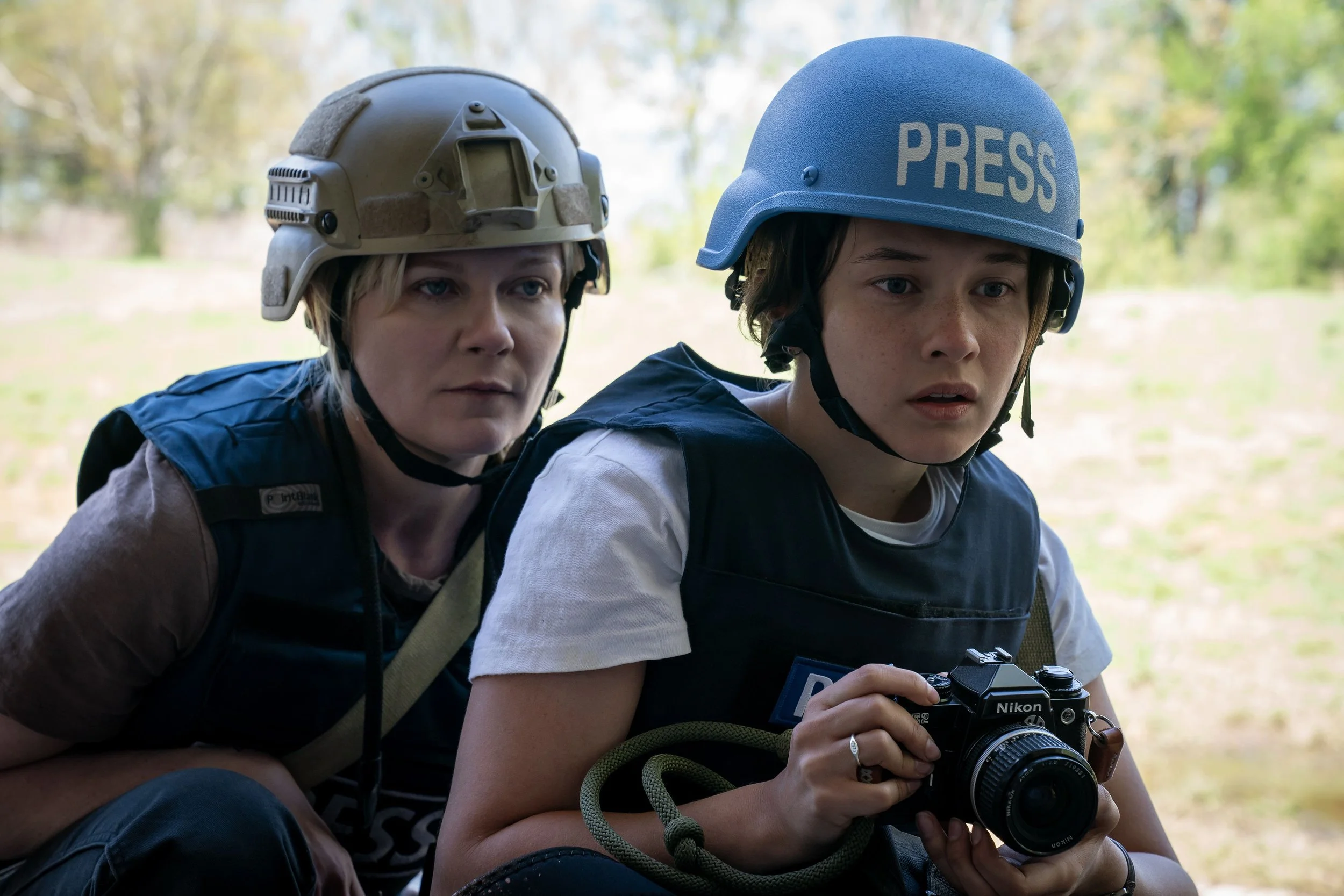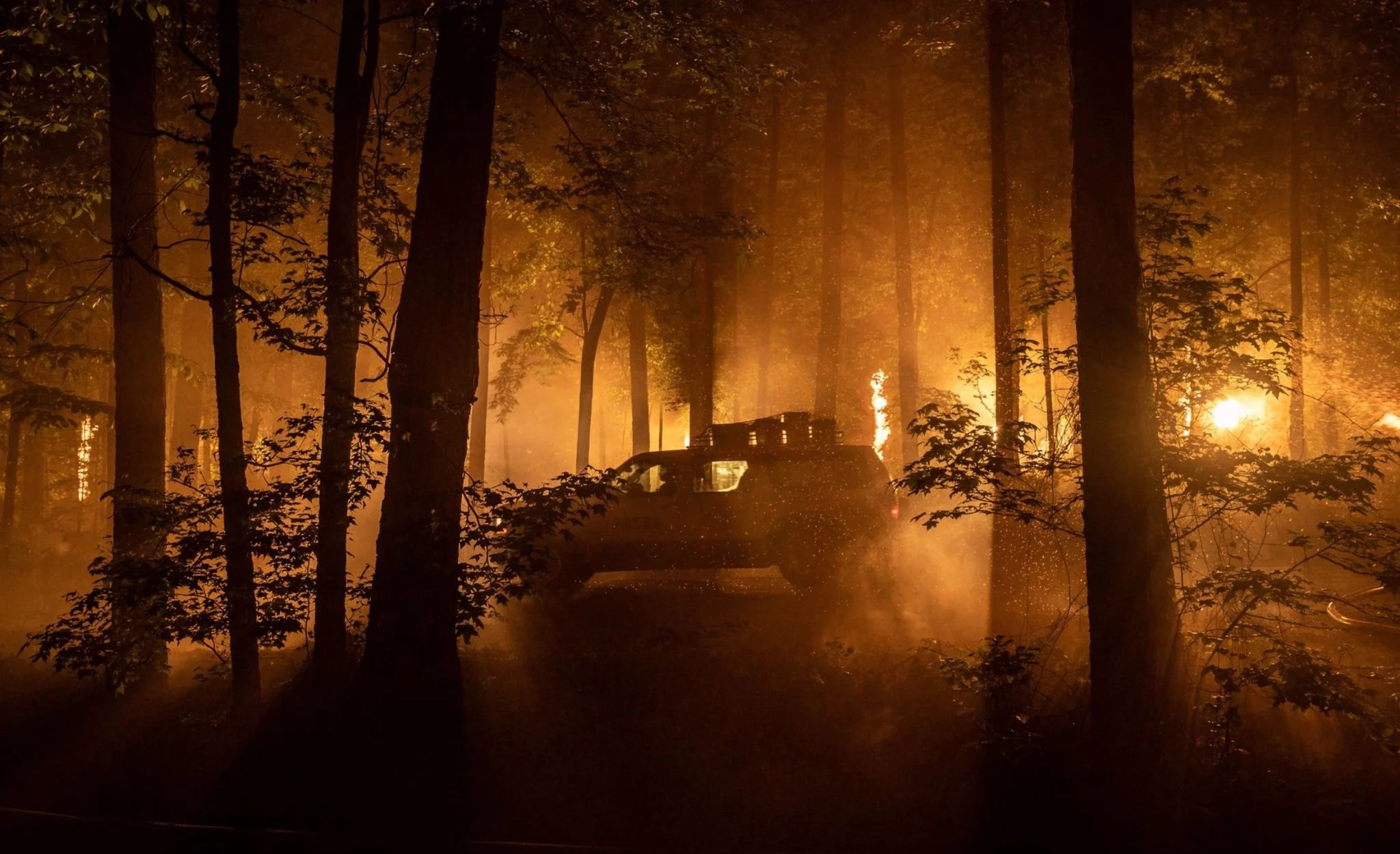Movie Review: "Civil War" Shoots Blanks
6/12 ForReel Score | 2.5/5 Stars
The frontline is Charlottesville. Welcome to Alex Garland’s newest world: a not-so-United States, one ravaged by a vague but bloody civil war on the doorstep of the White House. In Civil War, Garland, the English filmmaker behind the acclaimed Ex Machina and Annihilation, diverges from his normal genre fare and delivers a gritty, war-torn road-trip film, chock full of strong imagery masquerading as anti-war messaging. It is, without a doubt, a bold blockbuster in an important time, though its relevance should not be mistaken for commendation.
Image courtesy of A24
The film, branded as “must see,” follows a small team of D.C.-bound journalists, helmed by Wagner Moura and Kirsten Dunst, and rounded out by Stephen McKinley Henderson and the ascending Cailee Spaeny. These journalists make their way along the ravaged roads from New York City to Washington D.C. in hopes of documenting the presumed fall of the U.S. government, its capital, and its president. Throughout their trip, the team is met with a seemingly endless string of obstacles, each of which hint at larger, unseen powers at play. These pitfalls play out in the screenplay as isolated vignettes: first, a gas-station stop where AR-15 wielding men hold two looters hostage; later, a shoot-out between an Army squadron and an unnamed militia; later still, a jarring scene upon the discovery of a mass grave. Each vignette falls like a domino into the next, seemingly to evoke increasing gasps from an audience ignorant of the horrors of war; while on-screen, the horrors are documented for an ignoring audience by the photojournalists, their images snapshotted brilliantly for us to see. It’s a nifty editing trick that serves as a continual barrage of “gut-punches,” to be sure, but it is the actors snapping the pictures that truly stand out in Civil War.
While there’s been no shortage of great performances from Kirsten Dunst in recent years (2021’s The Power of the Dog rightfully earned her an Academy Award nomination), Civil War provides the first opportunity in almost two decades for mainstream audiences to see Dunst in a lead role; and she doesn’t let the opportunity pass unheeded. The quiet smoldering of trauma seeps from every facet of Dunst’s performance. She serves as a barometer for violence witnessed. Not only does the majority of the civil war’s bloodshed leave her unaffected, there are times when the episodic violence seems to bore her. “Why stress over a shoot-out, when you can watch the flowers sway in the breeze instead?” she signals. It’s no overstatement to say that Civil War rides on Dunst’s largely unflinching back.
Image courtesy of A24
The stand-in for Dunst-twenty-years-ago, Cailee Spaeny’s performance is also of note. Spaeny, playing a young photojournalist getting her feet wet in a pool too deep, secretly gets the main character arc of the film. It is through her that we see the toll of death leave scars, and she wears them well. Likewise, her caravan of supporting actors, Moura and Henderson, competently reflect the violence around them, though their arcs serve largely to keep a foot on the film’s pedal, rather than play an integral part of the story. (Alex Garland is nothing if not obsessed with women’s trauma.) If there’s a supporting actor in the film with a deeper sense of writing to his character, it is the single-scene stealing performance from Jesse Plemons.
Presiding over an unmarked mass grave, Plemons steps onto screen in bright pink sunglasses and nondescript military fatigues. It is clear from the circumstances that Plemons’ unnamed character is a different sort of war-time persona. He emanates cold dehumanization - a far cry from the stress, joy, or braggadocio of earlier encounters. Before the civil war broke out, he may have stamped passports, asked questions to faces he hardly glanced down at, moved callously through his methods. Here, upon this mass grave in Civil War, he goes through his motions in much the same manner, with far deadlier consequences. He has exchanged his stamp for an assault rifle. Plemons, as an actor, is show-stealing. Plemons, as the character, is terrifying, and he inhabits a complicated place in the film.
What makes Plemons’ unnamed villain so complicated in the larger Civil War is how uncomplicated his villainy is. His trigger finger depends simply on a very evil, very straightforward political inquiry: “What kind of American are you?”
Image courtesy of A24
Outside of the obvious reasons the question is jarring, it stands out as it’s dropped into a movie that is surprisingly ambiguous in its morality and politics. Garland goes to great lengths to avoid drawing lines in the sand, despite those lines being the very impetus of civil war. The war and its sides are ill-defined – there is still a United States government, but one that has seemed to turn on the larger American institutions, there is a Florida alliance (though we never find out who has joined the Floridians), there’s the obscure Western Forces (of which California and Texas are members, but Colorado is not), somehow Alaska is considered a neutral state, and according to Civil War’s Wikipedia page there is a “New People’s Army,” which I struggle to recount a single mention of in the film itself. Why has the American populace broken into, give or take, four factions? How are the Western Forces so far east, yet only constituted of two states? Why is there a proverbial bounty on the President’s head? Garland never elaborates. He is intentionally vague in his political line-drawing, which only undermines the world-building a film like Civil War necessitates.
The intention of the filmmaker’s ambiguity isn’t vague, however. He does it in the name of “journalism.” By keeping politics out of the film, he believes he is dropping his audience into the neutrality of his journalistic protagonists. But this isn’t how journalism works. Journalists record the facts with pen and paper, they take pictures that capture a moment. They are, when reported with integrity, neutral and devoid of politics, yes. But that doesn’t mean that the events they are witnessing – the events that make up the movie – are. These events are supposed to be political, and it is the role of journalists to convey factually what plays out, so audiences can decide the interpretation for themselves. But Garland is too scared to let us interpret. The events have been pre-stripped of their politics. He’s reaching to make a statement about the importance of journalistic neutrality, but his cowardice neuters his own mission statement before even making it on screen.
This leaves Civil War as, not only a confusing piece of movie making, but a pusillanimous work of political writing. And I’ve heard the retorts. I’ve heard that Civil War is merely trying to show audiences what that “next American civil war” would look like. But it isn’t. Because this isn’t what it would look like. There is no civil war, and certainly not one based out of contemporary America, devoid of politics. As adamantly as Alex Garland and his defenders would like to keep politics from defining Civil War, they can’t. This is America we’re watching. Politics are inescapable. Moreover, politics and their morality are more closely linked than ever before. It’s futile – and often infuriating – to pretend otherwise.
So, once again, we return to the frontline: Charlottesville.
Image courtesy of A24
I’ve gone out of my way over the last week to ask my American friends and family what they think of when they hear “Charlottesville.” I’ve gotten two answers: “That’s where Monticello, Thomas Jefferson’s slave plantation, is,” and, far more commonly, “The race war.”
Maybe Alex Garland, an Englishman, was unaware of Charlottesville’s standing in contemporary America: a city that shook the nation when Neo-Nazis took to the streets and killed Black Lives Matter protesters, while President Donald Trump stood by and endorsed them as “good people.” Maybe Garland wasn’t. Regardless, everytime the frontline is mentioned (which is often), Charlottesville’s name rang out to my American ears. It was more striking than any gunshot or bomb falling. It rattled something deeply political, which is intrinsically personal, in me.
The city of Charlottesville is inherently political, even if apolitically-minded people don’t realize. The city of Charlottesville, when dropped as the name for an American war front, becomes irrefutably political, even if apolitically-minded people don’t want to believe that. To then refuse to engage with politics, refusing to show us why the events of Civil War are taking place and who is responsible for the atrocities playing out before us, isn’t just irresponsible, it’s reprehensible.
Garland has no trouble ripping from contemporary American iconography (again, the intentionality of the Charlottesville choice matters little when there is a refusal to engage with what the city means politically). If I had a nickel for every insert shot of charred cars or burning buildings, whose footage looks like it was scrubbed of the CNN logo from the bottom corner, I’d make more than the cost of admission. It’s easier to let audiences shake their heads in contempt for a burning American flag than to actually say something, anything, worthwhile about the circumstances that brought about the flame.
Unless, of course, Alex Garland’s message is that violence is violence; in which case, Civil War should be advertised as a comedy for how laughably out of touch it truly is with American culture. The last two instances in which violence rocked Washington D.C., apart from the film’s rushed third act, were the storming of the Capitol by MAGA election deniers in 2021 and the thunderous taking-of-the-streets by protesters in the wake of George Floyd’s murder in 2020. Both were violent. Both were declarations of civil unrest, if not outright rebellion. Both could not be further from each other politically or morally. Luckily, we are able – thanks in large part to the diligent work of objective journalists – to distinguish between the two movements and recognize their differences politically and morally. That, however, is not something the characters of Civil War ever get the opportunity to do, because in Alex Garland’s America, there is no difference.
Acting and Casting - 2 | Visual Effects and Editing - 2 | Story and Message - 0 | Entertainment Value - 1 | Music Score and Soundtrack - 1 | Reviewer’s Preference - 0 | What does this mean?





